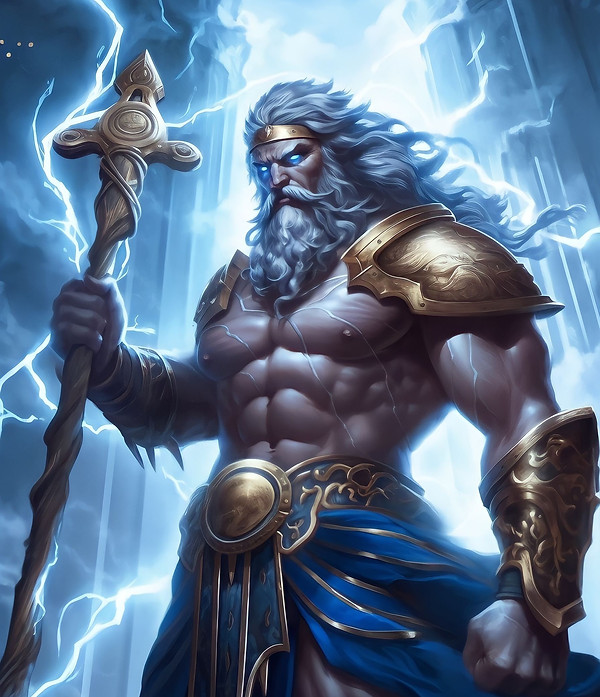
Zeus Art
King of the Greek Gods
"The Dice of Zeus always falls Luckily"
Zeus is the sky and thunder god in ancient Greek religion, who rules as king of the gods on Mount Olympus. His name is cognate with the first element of his Roman equivalent Jupiter His mythology and powers are similar, though not identical, to those of Indo-European deities such as Jupiter, Perkunas, Perun, Indra, Dyaus, and Zojz.
He was respected as an allfather who was chief of the gods and assigned roles to the others. Even the gods who are not his natural children address him as Father, and all the gods rise in his presence.
Zeus is arguably one of the most well known figures in Mythology and for good reason... The whole world watches when he cracks open the sky.





_JPG.jpg)

_JPG.jpg)
_JPG.jpg)












Zeus Art Prints
GREEK
Mythology
Greek mythology is the body of myths and teachings that belong to the ancient Greeks, concerning their gods and heroes, the nature of the world, and the origins and significance of their culture.
Footprints of their mythology are left in the form of architecture, statues & the writings of classical authors like Homer and Hesiod.
Many of the myths are allegorical and teach moral lessons for the human experience and personifications of different aspects of the human psyche. They also offer explanations for natural phenomena and the mysteries of universal creation.

12
The
Olympians
&
Popular Characters in greek mythology
FAQs
Who is Zeus in Greek mythology?
Zeus is the king of the gods in Greek mythology. He is often portrayed as a powerful, bearded man wielding a thunderbolt. He is also associated with the sky, lightning, and thunder.
Why is Zeus important in Greek mythology?
Zeus is one of the most important gods in Greek mythology because he is the ruler of all the gods and goddesses on Mount Olympus. He is also the god of lightning and thunder, which were seen as powerful forces in ancient times.
What are the 12 main Greek gods called?
The main gods in Greek myth are Zeus, Poseidon, Hera, Hestia and Demeter, Hades, and later on Apollo, Artemis, Hermes, Athena, Hephaestus, Aphrodite and Ares. Over the years, the Demi-god Dionysus became part of their group on Olympus. So i replaced Hephaestus with Dionysus because who doesn't love some wine and festivity?
What are the most famous Greek myths?
The most famous stories in the greek mythology includes Theogony: Clash of the Titans, perseus freeing andromeda, the Three Sisters of Fate, The Sea monster, Prometheus and the Theft of Fire, opening Pandora's Box, the birth of venus, pallas and the centaurm The Abduction of Persephone by Hades, Theseus and the Minotaur, Daedalus and Icarus, leda and the swan and many more. The stories of this classical mythology continue to impact contemporary art, art history and fine art massively.
How has Greek mythology influenced art?
Greek mythology has inspired art more than any other mythology in history. The trials of ancient Greek heroes and monsters have been depicted by the Renaissance masters for thousands of years. Shaping Contemporary Art, Famous Oil Painting, visual arts and much more. You will find it's influence in your national gallery, the conversations of any art historian and in art history itself, almost becoming a table of contents for any conversation about ancient tales.
Who is the Greek god of art?
Apollo is the Greek God of Art, poetry, Music, oracles, archery, plague, medicine, sun, light and knowledge. He was the son of Zeus and Leto and a deity of many functions and meanings. This is just one of many Greek myths that have shaped art history. The stories of Zeus and the battle of the titans, the birth of venus, leda and the swan, oedipus rex, the sea nymphs, perseus and andromeda, the sea monster and many more. Greek and roman history have impacted popular culture and art history greatly.
How does Greek mythology influence art history?
Greek mythology has had a profound impact on art history and is a popular source of inspiration for artists today. The ancient Greeks told stories about their gods and heroes through sculpture, pottery, and painting, These works of art often depicted mythological scenes and characters. You can find depictions of these stories in any national gallery of art as it's a powerful subject matter that has been a massive part of art history. Pandora's box has been opened as we walk each other through the world of Greek Mythology.
Blog
Check out the Blog here to read more about Art, Greek Mythology Art, AI Art and much more.
Enter your email address at the bottom of this page to stay up to date.
_edited_edited.png)









